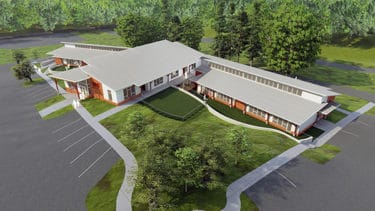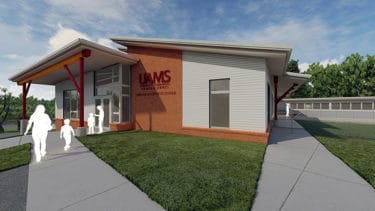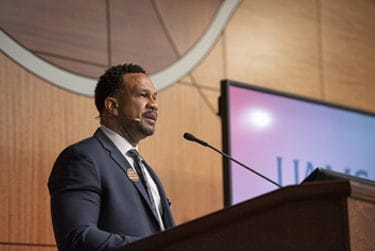Town Hall Speakers Highlight UAMS Efforts to Bolster Health Equity
| Increasing health equity and decreasing disparities inspire action at UAMS.
The efforts include operating a food pantry for students and employees that has distributed more than 245,000 meals, sustaining a student-run, faculty-supervised clinic that provides health screenings and preventative care to an underserved community and providing outreach to minority communities in Northwest Arkansas fighting COVID-19.
At a UAMS Town Hall meeting March 10 attended by 909 on Zoom, the focus was on these achievements and plans for many more programs to address health inequities. Chancellor Cam Patterson, M.D., MBA, mentioned several initiatives under way and others in development. (Watch video of the Town Hall here.)
Using wording from the Robert Wood Johnson Foundation, Patterson said health equity means “that everyone has a fair and just opportunity to be as healthy as possible. This requires removing obstacles such as poverty, discrimination and its consequences — including powerlessness and lack of access to good jobs, fair pay, quality education and housing, safe environments and health care.”
He said UAMS has made progress but has much more to do.
Stephanie Gardner, Pharm.D., Ed.D., UAMS provost and chief strategy officer, outlined the progress. The UAMS 12th Street Health & Wellness Center has provided screenings, preventative care and health education along with dental care for eight years.
The Stocked & Reddie food pantry opened July 2019, immediately meeting a need among UAMS students and employees before expanding during the pandemic to include Arkansas Children’s employees. The food pantry even started delivering groceries to those employees and students in COVID-19 quarantine and isolation. Through the 12 months of the pandemic, it has distributed 145,000 meals and made 15,000 deliveries.

An overhead view of the planned UAMS child development center expected to open in fall 2022.
A new program, the Homeownership Promotion Program, first launched in December, offers targeted financial educational classes, free tax preparation with the opening of a savings account, housing/credit counseling and homebuyer education offered by UAMS’ partner lending institution, Southern Bancorp Community Partners. In its first three months of operation, the program has received 114 inquiries, 44 employees have completed housing/credit counseling forms and 33 have attended at least one session with a counselor.
Gardner also unveiled concept art of a planned child development center that she said she was especially excited about.
“For many years, it has been a dream,” Gardner said. “Now, the child development center will become a reality. We see this as an unbelievable employee benefit, one that has long been listed in employee surveys. It’ll help faculty and staff, recruitment and retention. It’ll be state of the art and extend well beyond just providing day care services.”

A concept image of what the front of the child development center will look like once completed.
The child development center, to be a 20,415 square-foot facility, will be located at 11th and Monroe streets and will serve up to 198 children from infancy to pre-kindergarten. Pending approval, construction is expected to start later this summer, Gardner said.
Future plans also are being developed for a Boxed & Reddie market and coffee shop on 12th Street near the Health & Wellness Center. Located in the 12th Street Police Station in 3,291 square feet of space that is yet unfinished, the market will offer healthy easy-to-prepare boxed kits and fresh produce.
“With respect to the fact that this will be in the police station, our hope and expectation is that this provides a safe environment where people in the community can interact with police officers and vice versa, so these interactions aren’t always occurring in unsafe and vulnerable situations,” said the chancellor about the project. “Hopefully, that will build trust and better communication between the police and the community.”
Earlier in the Town Hall, Brian Gittens, Ed.D., MPA, vice chancellor for Diversity, Equity and Inclusion, used an analogy to illustrate the differences between diversity, inclusion and equity.

Brian Gittens, vice chancellor for Diversity, Equity and Inclusion, speaks at the Chancellor’s Town Hall.Image by Evan Lewis
“Diversity is getting invited to the party,” Gittens said. “Inclusion is being asked to partake in the things going on in the party, being asked to dance or what have you. Equity is ensuring that everyone has a way to get to the party. At UAMS, the party is access to quality health care.”
He described how his office is working to break down barriers with its Pathways programs to expose secondary school students to research fields that will make them competitive applicants for college, mentoring UAMS faculty and staff, and engaging churches in underserved communities about vaccination and health concerns.
Pearl McElfish, Ph.D., MBA, vice chancellor of the UAMS Northwest Arkansas Campus, explained how important similar outreach and partnerships have been to the university’s success in that region in efforts to fight COVID-19.
“We had extreme disparities for COVID-19 among our Latinx and Marshallese neighbors,” McElfish said.
About 17% of the general population in Northwest Arkansas identify as Latinx. They represent 45% of COVID cases. Marshallese are about 2.4% of the region’s population and were about 17% of the COVID cases.
“We knew we had to address this,” she said. “Community partnerships were central to doing that. We partnered with multiple organizations – all the health care organizations and nonprofits serving the Latinx and Marshallese came together.”
The alliance of partners put together a multi-component plan. They did serial testing at three testing sites and went door-to-door to homes where positive cases were identified and offered testing. Together, UAMS and the partners made sure people in those communities had personal protective equipment and resources through the partners. More than 3,000 families were assisted.
“If we continue to partner with the community, I am confident we can move the state of Arkansas from having some of the worst health disparities in the nation,” McElfish said. “We can move the needle if we focus on equity, make changes in the way we reach people, and ally ourselves with partners across the state.”
